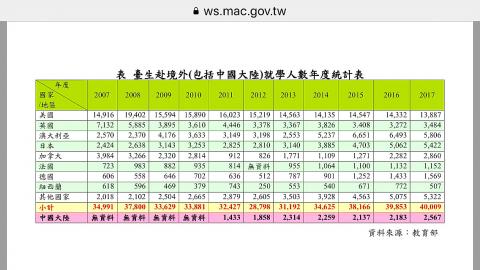The number of Taiwanese senior-high school graduates pursuing further studies abroad increased by more than 20 percent from about 32,000 people in 2011 to more than 40,000 people in 2017, the latest data from the Ministry of Education showed.
Due to the nation’s declining birthrate, the number of senior-high school graduates dropped from about 400,000 people in 2011 to 350,000 people in 2017 and further down to about 330,000 people last year, the data showed.
The number of senior-high school graduates pursuing higher education in China increased from 1,433 people in 2011 to 2,567 people in 2017, rising by about 80 percent, but accounting for less than 6 percent of the total number of those studying abroad, which shows that China does not attract Taiwanese students as much as English-speaking countries do.

Photo copied by Lin Hsiao-yun, Taipei Times
However, the increasing number of high-school graduates studying abroad poses a threat to the nation’s higher education system.
While Taiwanese universities still have a competitive advantage, the ministry this year is to grant an additional NT$1.3 billion (US$42.09 million) to 10 universities, including National Taiwan University, National Cheng Kung University, National Tsing Hua University and National Chiao Tung University, to enhance their international competitiveness, Department of Higher Education Director-General Chu Chun-chang (朱俊彰) said.
Ministry data showed that among the more than 30,000 senior-high school graduates studying abroad every year, the US was the most favored destination, followed by Japan, Australia and the UK.
In 2017, among the 40,009 senior-high school graduates who went on to study overseas, 13,887 people chose the US; 5,806 people picked Australia; 5,422 people went to Japan; and 2,567 people selected China, similar to the number that went to Canada, 2,860 people, the data showed.
The data also showed that among the list of senior-high schools whose students went on to study abroad after graduating in 2017, six of the top 10 schools were private schools.
Despite the media hype that Taiwanese students are increasingly choosing China for further studies, the data showed that a majority are still opting for the US or European nations, Chu said.
Boosting the competitive advantages of Taiwanese universities is the best way to keep senior-high school graduates in Taiwan, Chu said, adding that according to the Global Competitiveness Report 2017–2018 published by the World Economic Forum, Taiwan’s higher education and training ranked 17th in the world, while China only ranked 47th.
Aside from the additional subsidy to bolster universities’ competitiveness, the ministry is also cooperating with universities to offer international student exchanges, short-term programs, conferences and internship opportunities to attract foreign students and researchers to facilitate exchanges with students and teachers in Taiwan.
Taiwanese universities still offer students a chance to cultivate a global perspective and a promising future, Chu said.
Students opting to go to China should be aware of the risks that the Mainland Affairs Council has mentioned, because while Taiwan’s education environment allows freedom of speech and unlimited research topics, students in China have limited freedom of speech and expression in class or on the Internet, he said.

Several Chinese Nationalist Party (KMT) officials including Chairman Eric Chu (朱立倫) are to be summoned for questioning and then transferred to prosecutors for holding an illegal assembly in Taipei last night, the Taipei Police said today. Chu and two others hosted an illegal assembly and are to be requested to explain their actions, the Taipei City Police Department's Zhongzheng (中正) First Precinct said, referring to a protest held after Huang Lu Chin-ju (黃呂錦茹), KMT Taipei's chapter director, and several other KMT staffers were questioned for alleged signature forgery in recall petitions against Democratic Progressive Party (DPP) legislators. Taipei prosecutors had filed

Taiwan would welcome the return of Honduras as a diplomatic ally if its next president decides to make such a move, Minister of Foreign Affairs Lin Chia-lung (林佳龍) said yesterday. “Of course, we would welcome Honduras if they want to restore diplomatic ties with Taiwan after their elections,” Lin said at a meeting of the legislature’s Foreign Affairs and National Defense Committee, when asked to comment on statements made by two of the three Honduran presidential candidates during the presidential campaign in the Central American country. Taiwan is paying close attention to the region as a whole in the wake of a

President William Lai (賴清德) has appointed former vice president Chen Chien-jen (陳建仁) to attend the late Pope Francis’ funeral at the Vatican City on Saturday on his behalf, the Ministry of Foreign Affairs said today. The Holy See announced Francis’ funeral would take place on Saturday at 10am in St Peter’s Square. The ministry expressed condolences over Francis’ passing and said that Chen would represent Taiwan at the funeral and offer condolences in person. Taiwan and the Vatican have a long-standing and close diplomatic relationship, the ministry said. Both sides agreed to have Chen represent Taiwan at the funeral, given his Catholic identity and

Lawmakers from the Democratic Progressive Party (DPP) yesterday established a friendship group with their counterparts in Ukraine to promote parliamentary exchanges between the two countries. A ceremony in Taipei for the Taiwan-Ukraine Parliamentary Friendship Association, initiated by DPP Legislator Chen Kuan-ting (陳冠廷), was attended by lawmakers and officials, including Deputy Minister of Foreign Affairs Francois Wu (吳志中) and European Economic and Trade Office in Taiwan Director Lutz Gullner. The increasingly dire situation in Ukraine is a global concern, and Taiwan cannot turn its back when the latter is in need of help, as the two countries share many common values and interests,